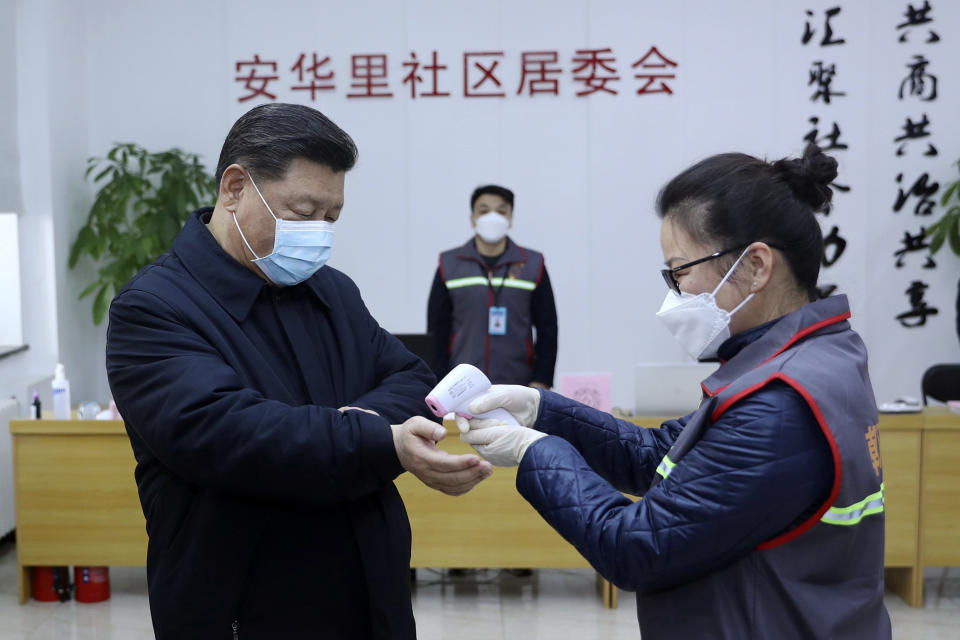'Chernobyl moment': Warning to China as it battles deadly coronavirus spread
Experts have warned the deadly coronavirus shares striking similarities to Chernobyl nuclear disaster as the Chinese communist party looks to get to grips with the outbreak that has now killed 1370 people.
There were a number of key political changes on Thursday, most notably the removal of Jiang Chaoliang, the chief of Hubei province where the virus has forced the lockdown of thousands of communities.
His dismissal comes amid fears China has continuously failed to inform the public and the rest of the world on the true severity of the outbreak.
The initial handling of the outbreak has also faced intense scrutiny, with the state accused of downplaying the virus and lacking transparency in its early days.
There is a feeling of discontent inside China that the leadership changes in Hubei have come a little too late from president Xi Jinping, who has kept a low profile since the outbreak, and could merely be a smokescreen to distract from the government’s own failings.

Dali Yang, a political scientist with the University of Chicago, told the South China Morning Post there was no escaping the outbreak is of “enormous proportions” and any failures would be blamed on the Xi and the government.
“It will be a crisis of Chernobyl proportions, especially because we will have to contend with the virus for years to come,” Yang said.
“Those who have sustained losses, in particular, will be asking questions, as has happened before in the aftermath of a crisis.”
The handling of the Chernobyl disaster in 1986 was widely criticised, with leaders accused of hiding the truth and failing to address the crisis early and efficiently.
Social media discontent shut down
Under Xi’s leadership, who came into power in 2012, China has continued its tight control over its 1.4 billion residents, with the age of social media no different.
Content published on Twitter-like Weibo and WeChat is heavily censored, particularly citizens’ content referencing the virus.
However public discussion online about the outbreak is rife and many have called for less secrecy from the government over the true impact of the virus.
China’s Chernobyl? The coronavirus outbreak leads to a loaded metaphor “Many linked the official ineptitude in present-day China and the Soviet Union’s final years and hinted that the Wuhan virus was something of a Chernobyl moment” https://t.co/FsJx2gx9Fs
— Yalda Hakim (@BBCYaldaHakim) February 12, 2020
The death of Li Wenliang, a doctor who died from the virus after raising the alarm over the virus in its early days, has also proved a pivotal moment after it was revealed he was reprimanded by police for speaking out over its potential implications.
The disappearance of a citizen journalist documenting the hospital conditions inside locked down Wuhan hasn’t helped the distrust from growing.
Chinese state media and government accounts have tried to shift the mood online and have flooded social media with a wave of positive posts regarding the virus, highlighting unity and a togetherness as China attempts to calm a nation amid the battle with the outbreak.
In another move aimed to ease fears, Xi announced a further 2600 military medical personnel into the virus’ epicentre – a move which again was broadcast with great importance.
Fears of anti-government content was one factor as to why China continues to implement a ban on certain western websites outside of its control including Facebook, Twitter and Instagram.
Transparency fears as death toll spikes
The sudden jump in the death toll and confirmed cases, which rose by more than 14,000, on Thursday prompted concern that the outbreak shows no signs of slowing down.
While the US has continuously voiced their willingness to help China with the outbreak, it appears tensions are growing between the two international powerhouses over the outbreak which the World Health Organisation’s chief Dr Tedros Adhanom Ghebreyesus described as a “grave threat” to the rest of the world.

“We're a little disappointed in the lack of transparency coming from the Chinese," Larry Kudlow, the director of President Donald Trump's Economic Council, told reporters on Thursday.
"Is the Politburo really being honest with us?"
Xi had initially said he had “personally directed” China’s response to the outbreak but state media later reported it had been “collectively directed”, with belief from some experts the president is looking to spread the blame for any mishandling of the outbreak, the South China Morning Post reported.
Despite growing discontent online from the Chinese public, the nation appears a long way off from turning on Xi, and such a move won’t come from within communist party.
“The Chinese culture is one that only blames local officials but never the emperor. There are already people cheering for Beijing as it sent investigators to Wuhan,” Chen Daoyin, an independent political scientist and a former Shanghai-based professor told the South China Morning post.
“And within the party, there’s no one with the guts or capacity to challenge [Xi] yet.”
Do you have a story tip? Email: newsroomau@yahoonews.com.
You can also follow us on Facebook, Instagram and Twitter and download the Yahoo News app from the App Store or Google Play.




